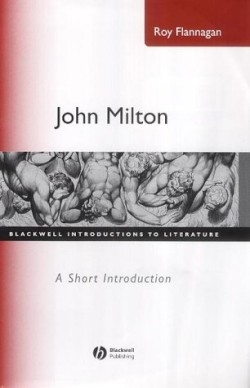John Milton
Despite the author’s disclaimer that this is not a
“Milton handbook,” it does provide a concise, engaging overview of the poet’s life, times, and major works-one that equips the reader to discuss the poet intelligently, and provides a solid foundation for deeper study. It is part of a series of introductions to literary periods and great writers such as Shakespeare, Twain, and Joyce.
Flannagan writes chronologically, in the manner of a biographer, briefly summarizing Milton’s upbringing in a well-off mercantile household in early seventeenth-century London; his education at St. Paul’s School and at Cambridge; his domestic life, which featured three marriages; and, especially, his career as writer and political activist. Incredible as it may seem, Milton’s poetry drew relatively little attention during his lifetime. Instead, he was famous-notorious, perhaps-for his prose essays. He advanced the concept of divorce on the basis of mutual incompatibility-mainstream thinking today, but scandalous then. Areopagitica, a defense of free speech, was “the most elegant legal statement in favor of unlicensed printing ever written.” Milton also flirted with danger by attacking Anglican church higher-ups and defending Parliament’s decision to execute King Charles I.
Yet Milton’s immortality rests chiefly in his poetry, and it is here that the book is most helpful. Flannagan, editor-in-chief of The Milton Quarterly and a member of the Ohio University faculty, explains the historical background of early works such as the echo poems L’Allegro and Il Penseroso; the mournful Lycidas; and the later epics Paradise Lost, Samson Agonistes, and Paradise Regained. His literary analysis is straightforward and multi-layered, touching on the rich imagery of Milton’s word choices and how his theology, politics, and eventual blindness affected his writing. “Words always have more than their surface meaning in Milton’s poetry,” the author notes. Commenting on Paradise Regained, the story of Jesus’s temptation in the wilderness, he adds: “Frankly, the more one knows about Milton’s life and prose writing, the more the Son (Jesus) sounds like John Milton-as precocious young man, as arrogant student, as bold adult controversialist never afraid to speak his mind, as wise old man who must reject the pagan idols of his youth.”
Flannagan has studied Milton for thirty years, and his love for his subject shines through. In the preface, he explains that he was “moved and excited” when first encountering the poet as a graduate student, but also consumed with a desire to understand who this man was. “I wanted to know what made him a genius, what made him an artist for all time.” His book will help others with similar yearnings begin their own journey of discovery.
Disclosure: This article is not an endorsement, but a review. The publisher of this book provided free copies of the book to have their book reviewed by a professional reviewer. No fee was paid by the publisher for this review. Foreword Reviews only recommends books that we love. Foreword Magazine, Inc. is disclosing this in accordance with the Federal Trade Commission’s 16 CFR, Part 255.

